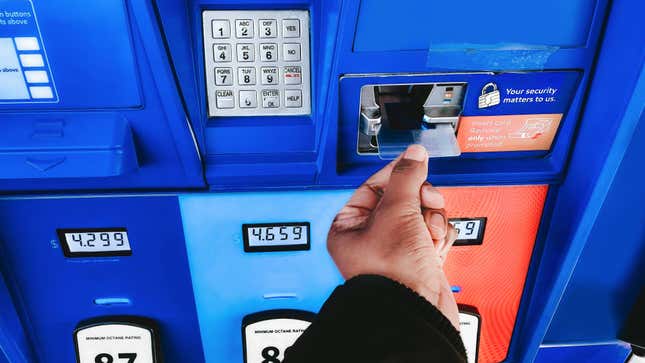
Exxon, Chevron, Shell, and BP, four of the largest petroleum companies, are raking in record profits. Meanwhile, prices at the pump have surpassed the (non-inflation adjusted) highs of 2008. If that dynamic seems fishy to you, you’re in good company. First, U.S. House Democrats and President Joe Biden raised concerns. Now, Letitia James, New York State’s attorney general, is officially suspicious, as well.
On Thursday, the attorney general’s office launched a statewide investigation into whether or not the gas industry is engaging in price gouging. In other words: Are companies artificially inflating the cost of fuel and taking advantage of consumers? And in other, other words: Are you getting more screwed over than usual? The probe was first announced in a CNN report; Gizmodo confirmed the news in a phone call with Halimah Elmariah, James’ deputy press secretary.
The investigation announcement comes a little over a month after the attorney general’s office urged New Yorkers to stay vigilant and look out for price gouging at the pump. As part of that statement, James asked to see citizens’ literal receipts.
New York has uniquely broad regulations in place that ban “companies from taking advantage of a crisis to charge excessive prices for vital and necessary goods and services,” according to another statement on the attorney general’s website. The law bars both “unconscionably excessive” and “unconscionably extreme” pricing determined via “unfair leverage or unconscionable means.” And that is absolutely the most times I’ve ever typed “unconscionab-” in a sentence.
The rules apply to a “wide scope of goods and services,” allowing the state to dig deep into every step in the supply chain that brings gasoline to you. Elmariah described the price gouge probe as an investigation into costs from “production to pump.” The attorney general’s office aims to assess not just the role of major oil companies in consumer cost, but also all the middlemen along the way: refineries, distributors, individual gas providers, and more. The barrel price of crude oil is just one of many factors that go into determining pump prices.
The per-gallon cost spike has mostly been attributed to Russia’s war in Ukraine, although gas prices were on the rise prior to the conflict and subsequent ban on Russian oil imports. Imports from Russia have historically fed only a small fraction of the U.S.’s massive gasoline appetite.
In 2021, the U.S. imported an average of 20.4 million barrels of crude and refined products a month from Russia, which totals about 8% of all U.S. liquid fuel imports. But that 8% is composed of lots of different types of liquid petroleum stuff. Just about 3% of U.S. crude oil, the product that’s refined into standard gasoline, comes from Russia.
Oil barrel prices have fallen and stabilized since their initial post-invasion spike, yet the costs consumers are paying continue to remain at record highs. It’s a phenomenon widely known as the “rockets and feathers” economic model, wherein sellers boost their rates to panic peaks as fast as they can, and then float prices back down as slowly as possible, while laughing all the way to the bank.
“Soaring gas prices are forcing working New Yorkers and low-income families to make difficult decisions on whether to pay bills or put food on the table. Price gouging is unfair and illegal and my office is determined to make sure it doesn’t happen in our state,” said Attorney General James in an emailed statement to Gizmodo. It is very true that high fuel prices disproportionately impact those who are already the most financially vulnerable.
However, it would be borderline malpractice to not throw in the reminder that we have about three years left to reverse course on greenhouse gas emissions. So while consumer protections are important, even when it comes to earth-killing petroleum, what’s even more critical is developing fossil-fuel-free rapid, sustainable, public transit systems.